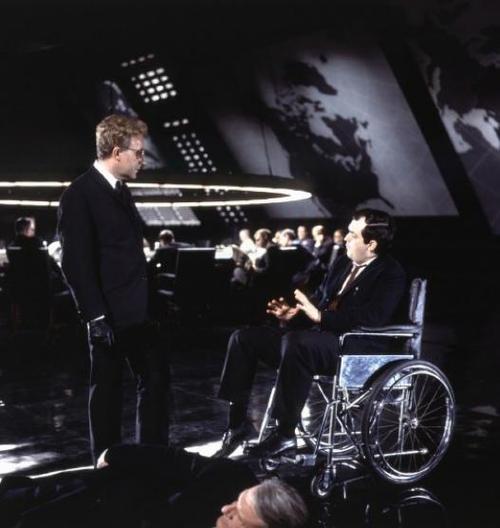Herman Kahn saw the glass half full. The futurist and systems theorist (mentioned at the end of the post on 1970s Swinging Singles) thought while nuclear war would be awful, it wouldn’t wipe out the entire species. There were varying degrees of awfulness. He was likely right, but his conversation about the end of much of humanity and his coining of the term “megadeath” made him one of the inspirations for Stanley Kubrick’s titular Dr. Strangelove character. Interesting that even someone so associated with nuclear believed that solar was the future. The following is an odd and disapproving 1974 piece about him from something called IPS, which apparently was a press service from loony Lyndon Larouche, one of the strangest figures of 20th-century Americans politics, who turned 92 last fall:
IPS INTERVIEW WITH HERMAN KAHN: WOULD YOU BUY A USED FUTURE FROM THIS MAN?
NEW YORK, N.Y., Nov. 24 (IPS)–In a recent interview with IPS, futurologist Herman.Kahn confirmed that no one but a criminal psychotic could field “ideas” for the Rockefeller family. The portly Kahn, who is the founder and director of the Hudson Institute, gained notoriety during the late 1950s by calculating the number of “megadeaths” that could be expected as a result of nuclear war between the United States and the Soviet Union.
Also present at the interview was Professor Robert Mundell of Columbia: University. Mundell organized the conference of bankers and econcmistsheld near Siena, Italy in September, exposed by IPS as a planning session for the Chileanization of Great Britain and Italy.
During the wide-ranging discussion, the following exchange took place:
IPS:
If you reduce the level of energy “throughput” into the biosphere, as the Hudson Institute proposes, you tend to set into motion entropic processes which get out of your control. The result would be an ecological holocaust. For example, in Brazil, where levels of nutrition and health have been reduced, you see the spread of new types of plagues faster than you can find vaccines for them.
Herman Kahn:
Well, there are two basic types of population curves, the up and down curve, where you expand population, overgraze, and so forth, and then have to reduce population. Or there is the collapse curve, where you have famine and disease. I would divide the world up into four categories. 1.4 billion people are “rich”–include Portugal in this. 0.85 billion live in Communist Asia. 1.05 billion are “coping”–like Mexico. and Brazil. That is, income is trickling down to at least one third of the population. People always misunderstand “trickle down” theories because they think wealth is supposed to get to the bottom. It never does … But there is no study which shows a correlation between hunger and disease. You won’t have plagues that kill half the world’s population. (At this point Mr. Kahn, who had ordered a Japanese dinner, paused to eat a raw squid.)
Robert Mundell:
No, we are about to have another plague. We have them every 300 years. You know, 1100, 1400, then–I forget the dates exactly.
Herman Kahn:
You mean the one in the eighteenth century where they all danced around?
Robert Mundell:
That was it. Anyway, every 300 years you wipe out half the world’s population.
Herman Kahn:
Oh, a cycle theory. I’m not sure about cycle theories…
Robert Mundell:
Well, anyway, I only make up these theories for fun.
Kahn, whose style is a blend of Jackie Gleason and Heinrich Himmler, turned his attention again to his raw fish, adding to the morning coffee stains on his shirt front.
Both these men, who have access to cabinet-level members of many governments,. have been touted as leading minds of the capitalist class. In fact, “Fat Herman,” as he is known to friends, is something of a public-display item, next to whom the other psychotic “planners” of the Rockefeller faction are intended to look sane.
Among his most recent efforts are a study of Britain, calling into question the country’s existence by the year 1980, and the preparation of a four-year development program for the “radical” government of Algeria.•


